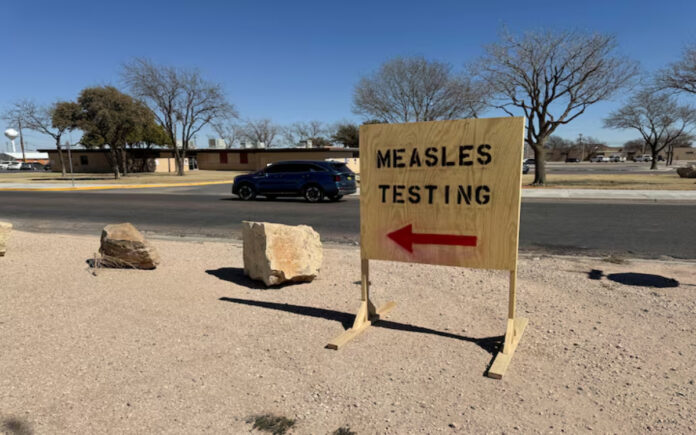Washington: A measles outbreak in Texas has claimed the life of an unvaccinated school-age child, marking the second child fatality in the state since the epidemic began in late January. The outbreak, which has now reached 22 states, has triggered public health concerns and renewed debate around vaccination policies.
The Texas Department of State Health Services confirmed the child’s death on Sunday, noting that the patient, who had no underlying health conditions, succumbed to pulmonary complications from measles while hospitalized. “The child was receiving treatment for complications of measles while hospitalized,” said Aaron Davis, spokesperson for UMC Health System in Lubbock.
The child, identified as 8-year-old Daisy Hildebrand by Health and Human Services Secretary Robert F. Kennedy Jr., died on Thursday. Kennedy visited the family in Texas on Sunday, offering condolences in the wake of the devastating loss.
The measles outbreak began in Gaines County, where vaccination rates stand at approximately 82%—well below the 95% threshold deemed necessary to ensure herd immunity, particularly for individuals who cannot be vaccinated for medical reasons.
When asked about the death, President Donald Trump told reporters aboard Air Force One that if the outbreak escalates, his administration will “have to take action very strongly.”
Kennedy, who has historically advocated for personal choice in vaccination, emphasized the effectiveness of immunization in controlling the spread of measles. “The most effective way to prevent the spread of measles is the MMR vaccine,” he stated in a post on X. Kennedy also reported that there were 642 confirmed cases nationwide, 499 of which were in Texas as of Sunday.
Although Kennedy has previously cited Vitamin A and good nutrition as supplementary measures for measles treatment, health experts caution against relying on such alternatives. While some studies in developing nations suggest Vitamin A can reduce symptom severity, excessive intake poses serious health risks, including liver toxicity.
The U.S. Centers for Disease Control and Prevention (CDC) continues to stress that the MMR vaccine is “the best protection against measles.” The disease spreads through airborne transmission when an infected person coughs or sneezes. The MMR vaccine is considered 97% effective after two doses.
In response to the outbreak, CDC teams have been dispatched to Texas at the request of Governor Greg Abbott. Pediatricians and healthcare professionals across the country are warning against vaccine hesitancy, asserting that supplements like Vitamin A are no substitute for immunization.
Republican Senator Bill Cassidy, a physician and chair of the Senate Health Committee, underscored the need for decisive messaging from national health leaders. “Everyone should be vaccinated,” Cassidy posted on X. “Top health officials should say so unequivocally b/4 another child dies.”
Cassidy had previously supported Kennedy’s confirmation after assurances that vaccine oversight would remain unchanged under his leadership.
Meanwhile, a scheduled Senate Health Committee hearing to discuss major structural changes at the Department of Health and Human Services—where roughly 10,000 positions are reportedly being cut—was postponed due to a procedural technicality. Cassidy had called for Kennedy to testify on April 10, but the committee failed to provide the required seven-day notice. A new hearing date has yet to be announced.
Also Read | Markets Suffer as Trump Compares Tariffs to Necessary ‘Medicine’
The Texas Department of State Health Services also noted a significant uptick in cases, with 59 new infections reported over a three-day span last week, bringing the total to 481 since the outbreak’s onset.
Elsewhere, measles outbreaks have been confirmed in states like New Mexico and Oklahoma. In New Mexico, an unvaccinated adult tested positive for measles posthumously in March.
Also Read | US-China Tariff Fight Sparks Massive Selloff in Chinese Markets
The CDC reported a national weekly increase of 124 new measles cases, bringing the 2025 total to 607—more than double last year’s total of 285. According to CDC data, 97% of current U.S. cases involve individuals who are either unvaccinated or whose vaccination status is unknown.
As public health officials and medical professionals battle to contain the outbreak, they continue to urge parents to rely on proven medical guidance rather than unverified alternatives to protect children from this preventable disease.



